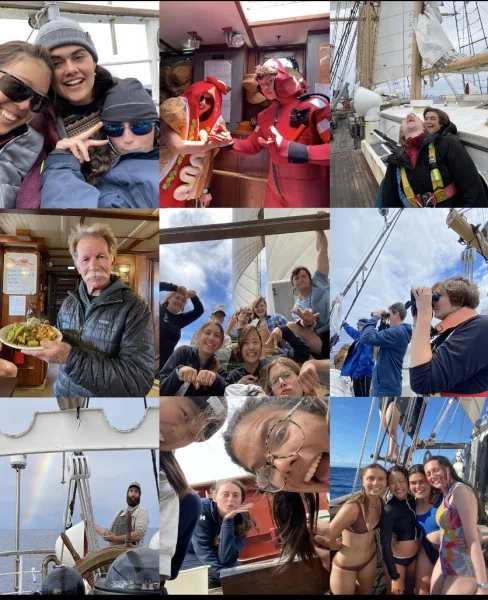Programs Blog
Preparing for Land Sickness

Sunmin (Sunny) Kim, A watch, Boston University
Ship’s Log
Noon Position
32°43.231’N 117°10.792’W
Ship Heading
NA
Ship Speed
At anchor
Weather / Wind / Sail Plan
Sunny!
Dear S304,
First stepping onto the Robert C Seamans (RCS) we were confused and nervous, not knowing what to expect for this seemingly challenging journey. We had prepared the best we could as we frantically executed last minute retail therapy for gallons of sunscreen to baby wipes and Hawaiian t-shirts. As we finished our first day of trainings and prepared to disembark Hawai’i, I have to admit that I have genuinely considered (and that is, numerous times) secretly making a jump to the comfort of land.
However, as we quickly lost sight of land, the RCS grew on me fast and fond.
Settling into our new roles as crew members of this ship, the RCS soon became our workplace, playground, café, and karaoke bar. It became our high tide, low tide, and rising tide all at once. It was our home away from home, and it was our everything (quite literally in the middle of the NPSG). Life became boat, and boat became life. We soon found our sea legs and boat gloves, and a world without moving tables and rocking beds became hard to imagine.
We were far from our families but we soon made new ones, those whom provided a shoulder to cry on, a voice to rely on, and a hand to pass the stays’ls with. To my luck, I always had someone to sing sea shanties, appreciate the sunset, drink too much hot chocolate and constantly make “knot” jokes with.
Living on the RCS together, we learned and absorbed at a speed greater than we have ever experienced or imagined. We learned how to have salty conversations. We learned how to steer a ship and gybe. We also learned that Viking attractions will no longer be as entertaining compared to standing on the bow sprits during look out.
However, above all, we learned how to ask questions and find our own answers to these questions. We have learned to trust and appreciate, not only just one other, but ourselves and our own capabilities. Only now do I realize that this whole time we were being trained, not just to become better sailors and scientists, but to become more improved versions of ourselves.
This ship has constantly humbled us and allowed us to reflect on ourselves, I am grateful for all of the lessons it has provided us with.
Thank you to all of our staff members who have helped us grow from a seasick bunch to boatswains (lover of boats). We appreciate your patience, care and love. You have helped us find our courage, intelligent brain, and loving heart (Yes, like the Wizard of Oz, but only better). We will forever cherish all of the giggles and lessons you have gifted us.
From bowlines to pickles, it has been one rollercoaster of a ride – and it has been my honor to be a part of it all. My dearest S304, keep it weird!
With love and gratitude,
Sunmin (Sunny) Kim, A watch, Boston University
PS: If we ever meet again, it will have to start off with: “Hey… I know you!”
Recent Posts from the Ships
- Ocean Classroom 2024-A collaborative high school program with Proctor Academy
- Collaborations and Long-term Commitments: SEA’s Caribbean Reef Program Sets a Course for Coastal Programs that Compliment Shipboard Experiences.
- Sea Education Association students prepare for life underway using state of the art nautical simulation from Wartsila Corporation.
- SEA Writer 2022, Magazines From the Summer SEA Quest Students
- Technology@SEA: Upgrades Allow Insight into Ocean Depths
Programs
- Gap Year
- Ocean Exploration
- High School
- Science at SEA
- SEA Expedition
- SEAScape
- Pre-College
- Proctor Ocean Classroom
- Protecting the Phoenix Islands
- SPICE
- Stanford@SEA
- Undergraduate
- Climate and Society
- Climate Change and Coastal Resilience
- Coral Reef Conservation
- Marine Biodiversity and Conservation
- MBL
- Ocean Exploration: Plastics
- Ocean Policy: Marine Protected Areas
- Oceans and Climate
- Pacific Reef Expedition
- The Global Ocean: Hawai'i
- The Global Ocean: New Zealand